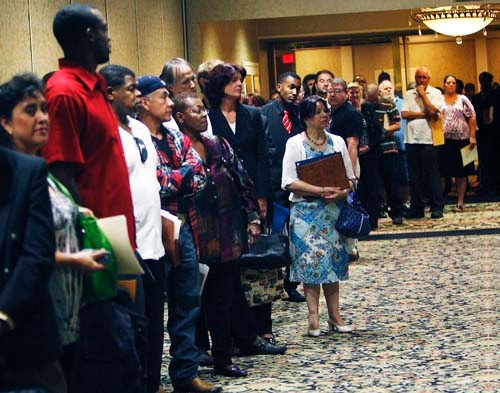Hiring in U.S. drops; Las Vegans leaving labor pool
Businesses dramatically scaled back hiring in May, pushing the nation's unemployment rate up to 8.2 percent and stoking fears that the economic recovery has stalled once again.
The Labor Department reported Friday that the country added 69,000 jobs last month - less than half the number that economists had expected. It also revised its estimate of job growth in April down from 115,000 to 77,000.
Markets plunged. The Dow Jones Industrial Average, Standard & Poor's 500 and Nasdaq indexes all slid more than 2 percent, with the Dow falling nearly 275 points by closing bell.
"It's just headed the wrong direction," said Keith Hall, a senior research fellow at George Mason University and former commissioner of the Bureau of Labor Statistics. "There just simply isn't enough growth in the economy to support job growth at a higher level."
Nevada's May jobless rate will not be out until June 15, but the state's April unemployment fell to a three-year low of 11.7 percent, including 11.6 percent in Las Vegas. It was the eighth straight month of jobless declines in the Silver State.
Local economists attributed the drop to people leaving the labor pool. About 20,000 Las Vegans left the workforce in the year before April. Just 2,000 locals landed new jobs. Numbers from the state Department of Employment, Training and Rehabilitation showed a labor force participation rate of 64.9 percent, down from 67.8 percent at the start of the recession.
Republicans called the data fresh evidence of President Barack Obama's mishandling of the recovery.
"Jobs are job one for the presidency," Republican presidential candidate Mitt Romney told CNBC. "The president's trade, energy and health care policies have held back growth and are scaring employees from hiring. All of them have made it less likely for businesses small and large to want to hire people."
Obama acknowledged the weak report in a speech at a Honeywell manufacturing facility in Golden Valley, Minn.
"Today we're still fighting our way back," Obama said before announcing a plan to help veterans earn certifications for high-tech manufacturing jobs, part of a White House initiative known as the Veterans Jobs Program. "We knew the road to recovery would not be easy. We knew it would take time."
Economists had hoped that lackluster job numbers in recent months were the result of a statistical fluke caused by unseasonably warm weather that sparked hiring gains earlier than usual. But Friday's data suggested something more like deja vu: Job growth is the weakest since May of last year, when the economy fell into a slump that lasted through the summer.
Analysts say the country needs to add roughly 130,000 jobs a month for the recovery to maintain momentum.
To make a dent in the unemployment rate, hiring must reach a rate of 250,000 jobs per month. The country has hit that mark only three times in a year and a half.
"Very few companies are willing to take money and invest in the future now," said Carl Camden, chief executive of Kelly Services, a global staffing firm.
There were small rays of optimism. The government also reported that consumer spending rose by 0.3 percent last month and that incomes increased
0.2 percent. Automakers announced strong May sales, with Chrysler up
30 percent in the United States.
But gloomy employment data overshadowed those bright spots.
"The sharpness of the deceleration seems consistent with other incoming data suggesting the economy, weighed down by heightened uncertainty over the European financial crisis and by growing concerns about domestic fiscal policy, slowed early in the year," said Joel Prakken of Macroeconomic Advisers, which helped compile the report.
The Labor Department's weekly tally of people filing for unemployment benefits for the first time also dampened optimism. The number rose by 10,000 last week, to 383,000, while the prior week's results were revised slightly upward.
Commerce Department data also showed that growth was slower than initially estimated. The agency revised first-quarter GDP growth down to a 1.9 percent annual rate, compared with the previously announced 2.2 percent.
"The domestic economy has repeatedly looked as if it was finally gaining traction, only to be beaten back again by the unique problems that keep surfacing during the recovery process," said Steven Ricchiuto, chief economist at Mizuho Securities.
The Las Vegas-Review Journal contributed to this report.

















